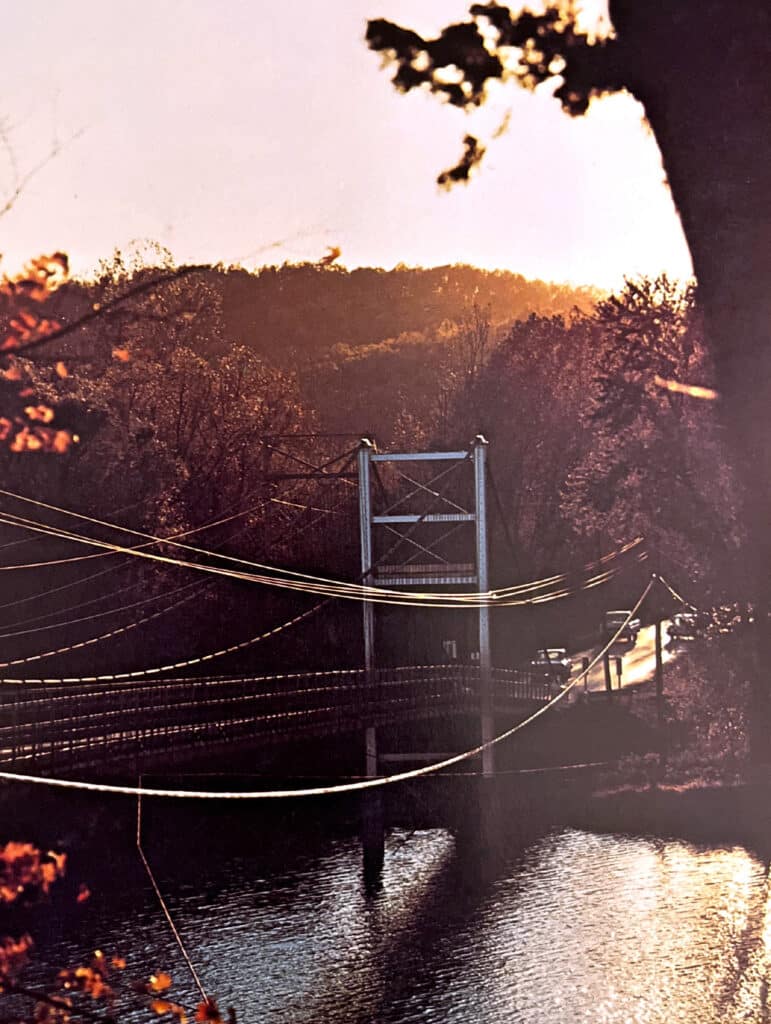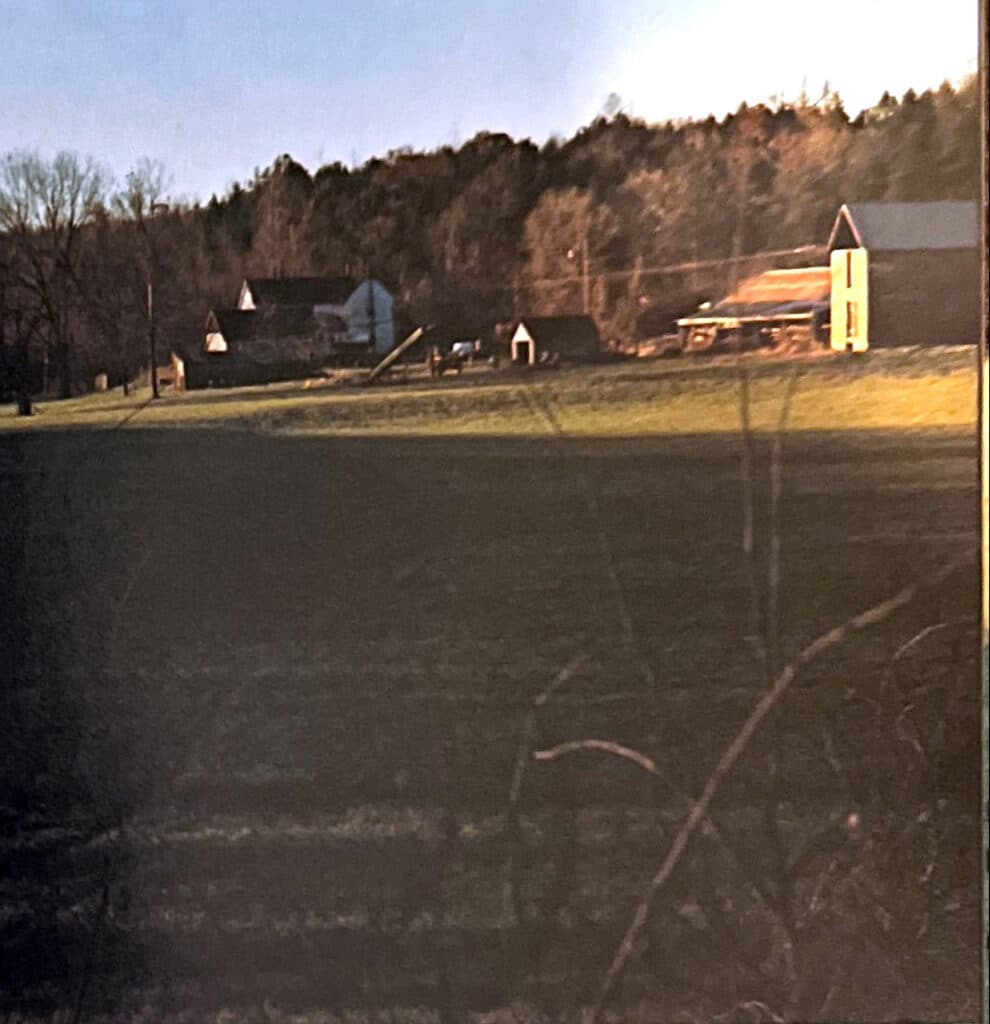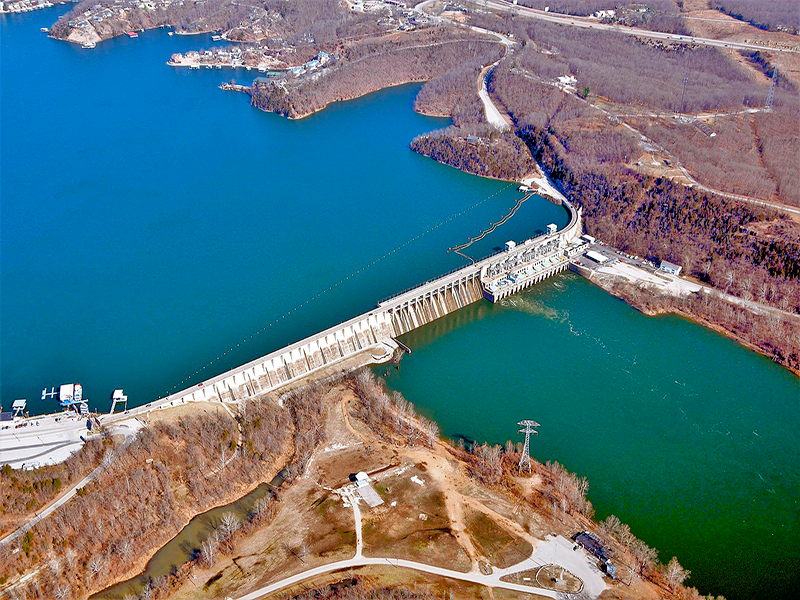Fifty years ago work was underway on a dam that would create Truman Lake. The locals were divided on whether the lake would help or destroy their economy. Missouri Life met with area residents to get their unfiltered opinions on the project.

By Leland Payton
Originally published in the September/October 1973 issue of Missouri Life.
A 248-mile section of the Osage River system survives free-flowing above Warsaw. The main Osage is here, one of America’s last large brown prairie rivers, unchannelized, crossed by few roads, the fields of its bottoms halting before the timber-ringed banks, its log jams hiding blue and flathead catfish fat and big as hogs.
In spring its flood raises are filled by paddlefish spawning. In winter the swamps of its upper reaches hold snow and blue geese and tens of thousands of mallard ducks watched over by bald eagles. An agricultural society has come to accept the limitations of the Upper Osage country. Man and Nature live in harmony.
If the 209,000-acre Truman Reservoir is completed, the land will change radically. Some believe for the better, some for the worse. This is a look at what the area is now, how some of its people feel about the dam and how they live.
Osceola mid-morning in August. Through glassless windows we see the Osage River, hear the constant thunder of the run of the river dam, occasionally drowned out by the thunderstorm. The cafe is abandoned. It was bought by the Army Corps of Engineers. The backwaters of the Truman Reservoir will cover this place if the Truman Dam at Warsaw is completed. River fishermen are waiting for the rain to stop.
CECIL VICKERS: “Well, actually, the way I see it, if they’d just leave it alone and didn’t build the lake it’d be a good deal. That’s the way I feel about it. We’ve got lakes all over and we do have a good place to fish here on the river as it is. I don’t think it’d be any good after you get the lake in, really. They’re gonna ruin the channel catfishing. There won’t be no use to thinking about channel catfishing.
They’re trying to stop building that lake now. They’ve tried to stop it two or three times and haven’t had any luck. I still don’t think they need the lake. That’s the way I’d see it.”
ADRATH BAKER: “Oh, I used to fish the river here a lot and I enjoyed fishing on the river. It ain’t gonna be the same for sure when they get the lake in. I don’t like lake fishing too well, anyhow, but I used to come up and set trot lines a lot up here, you know, trot-line fishing? Stay over the weekend maybe or something like that. Had a lot of fun, but I don’t think I’m gonna enjoy it when they get the lake in. Yeah, I growed up down there at Dunnegan.
BLAINE BUTCHER: “A lot of ’em wants it and a lot of ’em don’t. There’re people down there lived there all their life, that’s the only home they ever had. That makes a big difference, you know.
It is noon and the rain lightened. Some of the fishermen went back to the river, others drifted away to eat lunch. These river fishermen were workers or farmers. They wore overalls, faded blue or gray workshirts and rubber boots. One automobile was among the pickup trucks parked outside. The man that drove it was dressed in navy blue slacks, a white belt, blue and white checked sport shirt, navy socks and white shoes. He worked for the IRS and lived in Sedalia.
W. KENTON VANVICKLE: “The land it will cover, I, myself, at least in my own opinion, it isn’t high value land. Actually, it might be a brash statement to make, it would appear actually that the water might be worth more than the land. I don’t know. I might offend some people saying that but I think in the long run it will turn out that way because it ain’t high-producing land agriculturally—not compared to agricultural land that we have throughout other areas in Missouri.
I think in the long run it’ll be a small sacrifice.
Basically, I’m taking a rather dim view of some of the controversy that’s been brought up. I think, generally, most of the groups have possibly caused the controversy more to direct attention to themselves than anything else. It’s no more than, let’s say, that we have to cut down a tree to build a building. Certainly we have to improve areas around us, one way or another.
Was, at least at one point, considered to be an improvement. But I don’t think we’re destroying all of the wilderness areas by any means. There’ll be plenty of those yet to preserve.”

Taberville, a hamlet between the pecan groves along the Osage River and the prairies. Towards the river we hear the drone of cicadas, from the prairie the resonance of katydids. Besides a dozen houses. Taberville has a church, a gas station, a bait shop and a trailer cafe, until recently called Wilbur’s Greasy Spoon Cafe. On a concrete slab next to the gas station a group of men sit in lawn chairs. Sitting on the concrete and standing around them are boys. One of the men summarizes his feeling:
“Personally, I kinda hate to see the thing go in but it’s already started, and I don’t see how anybody can ever stop it. They’ve spent lots of money on it
I don’t know how they’ll ever stop it. You can’t … stop progress. If they’re gonna build it, I guess they’re gonna build it. Never been able to convince a lot of people that the benefits’ll offset the damage it’ll do. I know one thing right now, there’s a shortage of a lot of things, including farm products. They’re just beginning to realize what the farmer—I been a farmer all my life, I can talk a long time on that. I know that there’s a big change coming in this food situation. You can see it yourself, you go to the grocery store. And as they cover up several thousand acres of good productive land, that’s land that’s gone that’s one thing for sure.
I’m just a little bit—I don’t mind telling you this, a little bit biased against it, because it’s gonna cover up my old home place, where I was born and raised. Now that’s the only reason that I’d have that to say but you talk to some of these farmers like that old boy that left here a while ago and he’ll tell, if you can get him to talk, he’ll tell you why in a minute, why he’s against it. ‘Cause it’s gonna take almost all of his land.”
It is Sunday morning, and the place is still except for the blowing sound of the wind.
Sightseers from several states arrive, glimpse the view, glance at the Corps of Engineers maps, use the restroom and drive off. Most approve of the dam, most think it will be a good thing, good for business.
Oscar Chrisman says he is generally for dams but: “Well, I never was for it. On account of the flat valley of the Osage and Grand. It floods such great amount of wonderful farming country. I never could be enthusiastic about it. Excepting, after they get it built, I’ll enjoy the fishing”
He laughs and loads his pipe. His companion Edmund Schneider had once owned some of the land below the Overlook.
“I farmed right up there. We had 1100 acres of farmland in there. They bought all of that…. All under water when the lake is filled.”
From the indications and the way things are going and the food shortage we may have, your grandchildren may live to see the day where they’ll drain this and farm this land to produce food.
I don’t believe there’ll be a lot of development on this one. Because you’ll have to live so far back, there would be no incentive to develop around this lake anywheres.
Charles Lane, a young man who said his family had a hardware business in Warsaw. He was working for the Corps.
“I been involved in this all my life. This project has been talked about long before I was ever born. Well, as I’ve seen it on other projects—like, I’ve been to Stockton. I hope it changes, I hope it gets better, ’cause Stockton right now is a ghost town and I hope this doesn’t turn into one. All the men left, you know, and I guess they just haven’t got started yet. People aren’t moving in or anything like that. I hope it brings lotsa recreation and more business and more people down here. That’s what I’m hoping but you never know until it actually turns out.
Everybody around here thinks it’ a good idea.
They’ve been helping fighting this environmental—EDS. They been fighting them. They’re trying to shut the dam down cause of the spoonbill, the paddlefish. It’s all environmental, you know, they think this’ll kill all the paddlefish in the river but it won’t. They don’t know what they’re talking about.
Well most of the farmers gave it up all together. ‘Cause the amount of money they got couldn’t begin to replace anything they had. The government wa supposed to give them an adequate amount to take care of it but it doesn’t.”
V.H. MONTEIL: “My name is Monteil and I live in Kansas City. We have a cabin down on the Lake of the Ozarks . I think this is the finest thing that ever hit the area. They ought to throw this environmental agency somewhere. Well, that’s the truth.”
MRS. MONTEIL: “Well, we’re just real happy about this being put in here because it’s going to mean so much to everybody. You know, having clear water down there at our cabin and all that stuff. It’s gonna clear up the whole lake and we won’t have all that stuff. It’s gonna clear up the whole lake and we won’t have all that muddy water and all that.”
MR. MONTEIL: “Oh, there’s probably 2 or 3 farms around here that might have 20 or 30 acres of ground and don’t even raise food on it. Now they will be covered, yes … But 1 or 2 farms for the good that this is gonna do. There ain’t enough farmlands gonna be hurt to amount to anything. They’ll clear land adjoining the Lake of the Ozarks if they want to raise a few green beans and carrots. They’ll have plenty of room there. They say that this is the only place there is. There’re spoonbills all over the United States. Why, sure.”
EARL E. JAEGER: “Aren’t we in a crisis of energy, power in this country? Well, if we are, don’t we need water power; we’re getting a shortage of gas and things like that. And as far as some of them saying, well, the game that it’s gonna kill. Well the game’s got a lot of land to cover and I don’t think that’s a talking point.
There’ll be fishing there just the same. I don’t think the fishermen have anything to gripe in cutting off their river.”
FRED DINWIDDIE (a Marine stationed in San Diego): “Might be a lot of people down here that don’t really like the area and just haven’t had a chance or a good reason to get away. And this dam would be a good reason. Sell the land and put it to good use. And it’ll bring a lot of business down here.
I think the game is gonna have to move out and find a new place. That won’t be too hard for them.”
Skyland Ranch in the bend opposite See Bluff. Under a silver maple, beside a white pre-Civil War farmhouse, we listened to Charles F. Hall’s views.
“The area as a whole has been greatly affected by this project. And individuals many, many individuals have been affected to where there’ll be irreparable damage in their everyday life, in their operation of their farms and ranches.
When I came to this valley 25 years ago there was a lot of opportunity in the whole general area. And I, as one individual, I think have the best ranch in the entire basin, most productive. These things have been very, very provocative to all of us landowners; the methods of the government and the power the government has to destroy our land.
There’s 55,800 acres involved in this and it’s truly a disgrace to our nation what the government is doing, not only in this basin but in many, many other very productive basins in the Midwest area.
In regard to our economy of our community there’s been business after business folded. Just as of two weeks ago, our Kraft food plant folded up here and there’s been John Deere Implement, International Harvester, Production Credit Association, a drive-in theater, 3 service stations, the locker plant. There’s some others also involved.
When they were brainwashing the people in the basin, including me, in the meetings the Colonel would have in our community building in Warsaw … Why all the brainwashing they give uswhat a wonderful thing it’ll be for the community and the area in general and the state of Missouri and the tourists it’ll bring.
We lived a serene type of life. We enjoyed nature, we protected nature, we lived as a part of it. And as far as lifestyle is concerned, it’s made enemies of neighbors. Many, many people—the whole ecology of the thing and the attitude of the people have all been changed, even my own. This thing has really left a sour taste in my mouth, to our government, especially the Corps of Engineers and the Congress and the Senate and everybody that’s involved in this. They don’t take an interest in any of these projects and delve into it and see exactly what it’s gonna do to the people and they could care less. These are facts, because I’m speaking them, because I’m part of it and I know what I’m talking about. I been in on it.
I’m a red-blooded American and a pretty hardheaded one. I don’t mean to be derogatory about it but I love my country and I think it’s a disgrace to destroy this land. Not only like the one that you’re seeing here but I can fly you up this basin and show you thousands of acres, very productive. And these are just actual facts which the public has not been informed of. They just take it with a grain of salt. They’re paying their laxes and they’re forced to do that. Their taxes are being blowed. If the average taxpayer would come down here and see the squalor and squander and the waste of their tax money, in my opinion there’d be a revolution over it. Now the attitude is well, hell, we’ve got ourselves into this thing … all this has been destroyed, why let’s build it. Go on with it. They’re looking to the future in the dark.
I’ve had overflow three times in 25 years and as soon the river goes down, I’d go right back, and still get some production off the land. I’ve had more trouble with the economy of the country than I have with the river, I can assure you, much more.
The amount of money it’s going to take to complete this dam and the destruction it’s going to cause, the country as a whole would be better off to utilize the immediate dam area over there for recreational purposes or whatever they can come up with and put every bit of this back into private hands and agriculture and get out of here. I mean stay out. The productivity of the land over the next few years will more than offset the money they’re spending over there. There wouldn’t be a dime lost.”
Meanwhile, the Osage flows on … for now.
Your Missouri Lake Guide • Missouri Life Magazine
Related Posts
Lake of the Ozarks Fills
On February 2, 1931, Lake of the Ozarks began to fill after the completion of Bagnell Dam.
December 19, 1973
One of the worst traffic jams in St. Louis history was caused by a blizzard and the last minute Christmas shoppers.


